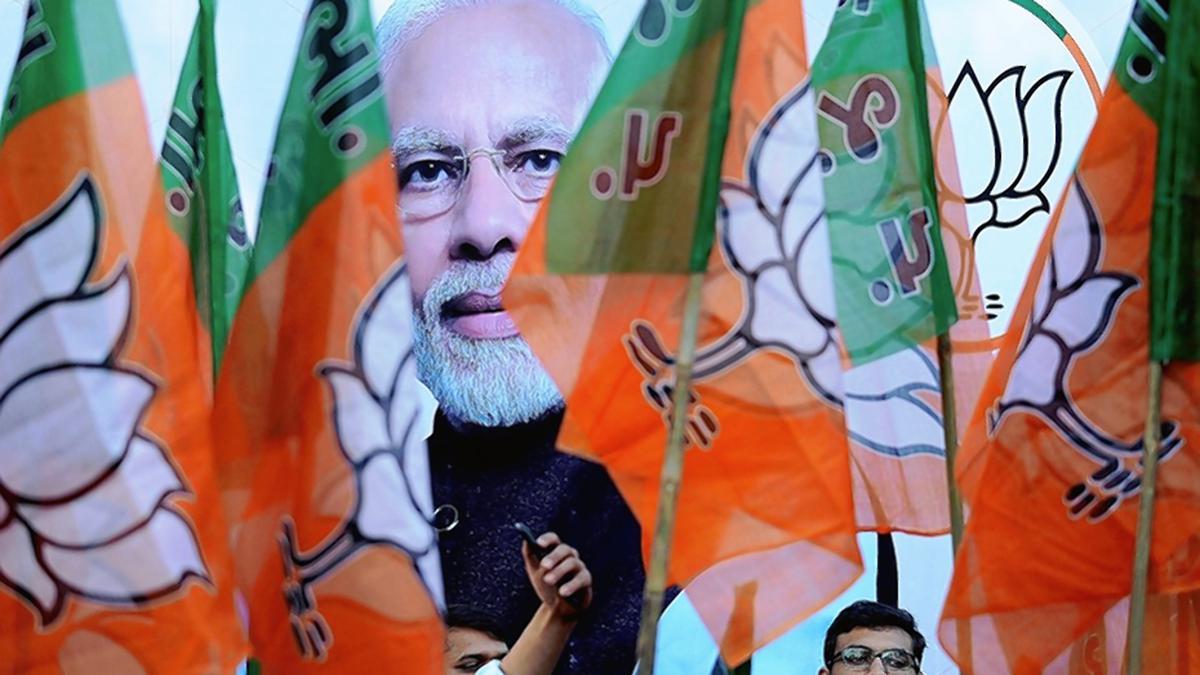
Indian State Elections Go The Modi Way, But Congress Makes A Dent In The South
Colombo, December 3: The Bharatiya Janata Party (BJP), whose mascot is Indian Prime Minister Narendra Modi, has won in three of the five States which went to the polls on different days in November.
The results of all elections, except the one held in Mizoram, were announced on Sunday. The counting of votes in Mizoram will take place on Monday.
The States in which the BJP won are: Rajasthan, Madhya Pradesh and Chhattisgarh, all in North India and all Hindi-speaking. The BJP has always been strong in what is called the“Hindi belt” (or“cow belt” as it is largely agricultural and culturally conservative).
As per the past pattern, the BJP lost in the South Indian State of Telangana, where the language is Telugu. In Telangana. the Congress wrested the government from a regional party Bharat Rashtra Samiti (BRS).
In a State election held earlier in 2023, another South Indian State, Karnataka, had gone to the Congress. So, the entire South Indian region is a non-BJP area. Andhra Pradesh and Tamil Nadu, which are also in South India, are ruled by regional parties. And Kerala is under the Communists.
The North and South differ in ideological orientation. While the North is very receptive to Hindu nationalism or“Hindutva” the
South is not. The South is not only more secular but is also equalitarian in its ethos. In the North, religious affiliation overwhelms other considerations such as social justice, caste inequality etc.
Of course, there are considerations other than Hindu nationalism in a voter's mind when he or she makes a political choice. Among these are: the way the government delivers social welfare schemes and whether there is corruption and malfeasance in the implementation of schemes.
It is generally granted that in the BJP-ruled States in the North, delivery of welfare schemes is satisfactory. The BJP government in Karnataka fell because it was wanting in this regard. It lost the last elections to the Congress.
The latest round of elections signified the popularity of“Hindutva”, an ideology which is based on Hindu consolidation against the minorities (especially Muslims), in the Hindi belt. The Congress tried to divert the attention of the voters by speaking loudly against glaring caste and economic inequalities. It proposed that a census of castes be taken to know their relative social and economic status.
But this appeal got no traction. Hindu unity got traction.
The Congress leaders' attempt to portray themselves as good Hindus by publicly performing Hindu (Brahminical) rituals did not cut ice with the voters for whom the BJP was the only genuine Hindu party.
A factor related to Hindutva is a muscular foreign policy. Hindutva entails strong steps to counter perceived threats from Muslim Pakistan and the Islamic world. The Modi government's aggressive stance on Pakistan and cross-border terrorism and its resistance to the hegemony of Western democracies are lauded by sections which are under the spell of Hindu nationalism. Israel is their role model.
For the Congress to make headway in the North, many experts suggest that it should stop pretending to be a Hindusitic party. It should give an alternative world-view to the voters, one that is secular, equalitarian and Gandhian in its approach. But there are others who argue that since the flavour of the season is aggressive Hindu nationalism at home and jingoism abroad, it will be futile to propagate a secular and Gandhian ideology which has passed its expiry date.
Rahul Gandhi kept saying that the Congress offers love in place of the hate touted by the BJP, but clearly, it fell on deaf ears.
The Congress may also have to change the issues that it has been taking up, issues such as the concentration of wealth and economic influence in the hands of a few oligarchs like the Adanis and the patronage they get from Modi. The Adani's monopolies and his alleged shady dealings are clearly not an issue for the common man.
Coming to the consequences of the election results, the most striking consequence is the tremendous psychological advantage that the victories have given the BJP and Modi, personally. The BJP and Modi will now go with gusto into the country-wide parliamentary elections in May 2024.
Conversely, the results will dampen the spirit of the Congress and its allies who come under the rubric of“I.N.D.I.A”.
The leadership of Rahu Gandhi may be challenged within I.N.D.I.A. But will Rahul and the Gandhi family give in without a fight? After all, the Congress is still the single largest party in the alliance and the only all-India party among them.
The constituent parties of I.N.D.I.A
will be meeting in New Delhi on December 6 to take stock of the situation and chalk out a plan for the future.
END

Legal Disclaimer:
MENAFN provides the information “as is” without warranty of any kind. We do not accept any responsibility or liability for the accuracy, content, images, videos, licenses, completeness, legality, or reliability of the information contained in this article. If you have any complaints or copyright issues related to this article, kindly contact the provider above.
Most popular stories
Market Research

- Manuka Honey Market Report 2024, Industry Growth, Size, Share, Top Compan...
- Modular Kitchen Market 2024, Industry Growth, Share, Size, Key Players An...
- Acrylamide Production Cost Analysis Report: A Comprehensive Assessment Of...
- Fish Sauce Market 2024, Industry Trends, Growth, Demand And Analysis Repo...
- Australia Foreign Exchange Market Size, Growth, Industry Demand And Forec...
- Cold Pressed Oil Market Trends 2024, Leading Companies Share, Size And Fo...
- Pasta Sauce Market 2024, Industry Growth, Share, Size, Key Players Analys...





















Comments
No comment